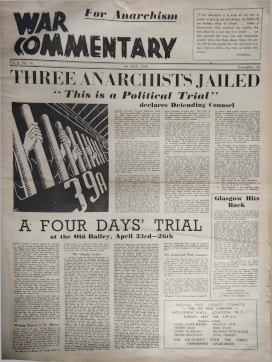War Commentary facts for kids
War Commentary was a special newspaper published in London, England. It came out every two weeks from 1939 to 1945, during World War II. The newspaper was created by a group called Freedom Press.
This paper was against war and against governments having too much power. It also disagreed with the idea of capitalism, which is an economic system where private businesses own most things. War Commentary took over from earlier papers like Revolt! and Spain and the World.
Many people helped write for War Commentary. Some regular writers included Vernon Richards, Marie Louise Berneri, John Hewetson, and Philip Sansom. Ethel Mannin also wrote for the paper. John Olday drew many cartoons for it. Other people like George Woodcock and Colin Ward sometimes contributed too.
The 1945 Freedom Defence Trial
The British government watched War Commentary closely. They were not happy with its anti-war messages during World War II. Police and secret services like Special Branch and MI5 kept an eye on the people involved with the newspaper.
As the war was ending in 1945, the police took more action. Four editors of the paper were arrested. These were Marie Louise Berneri, John Hewetson, Vernon Richards, and Philip Sansom. They were accused of trying to make soldiers unhappy with the war.
Their trial lasted four days at the Old Bailey court. Many newspapers reported on it, and it caused a lot of public discussion. A group called the Freedom Defence Committee was formed to support the editors. Important people like George Orwell and Bertrand Russell joined this committee.
In the end, Richards, Hewetson, and Sansom were sent to prison for nine months. The charges against Marie Louise Berneri were dropped. This was because, at the time, a wife could not be charged with working against her husband. She was reportedly very upset about this rule.
While Richards, Hewetson, and Sansom were in prison, Marie Louise Berneri and George Woodcock became the new editors. The court case actually made War Commentary and Freedom Press more famous. The Freedom Defence Committee continued its work until 1949.
In August 1945, War Commentary changed its name. It was relaunched as Freedom.


